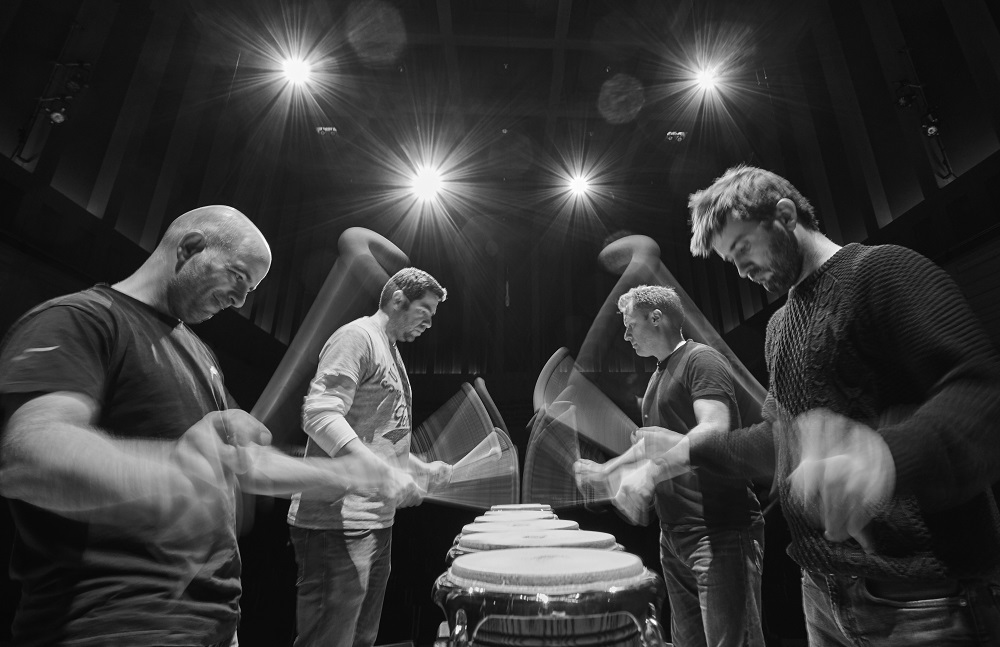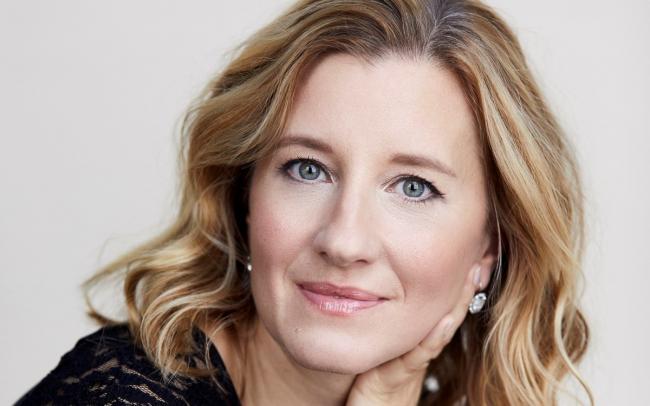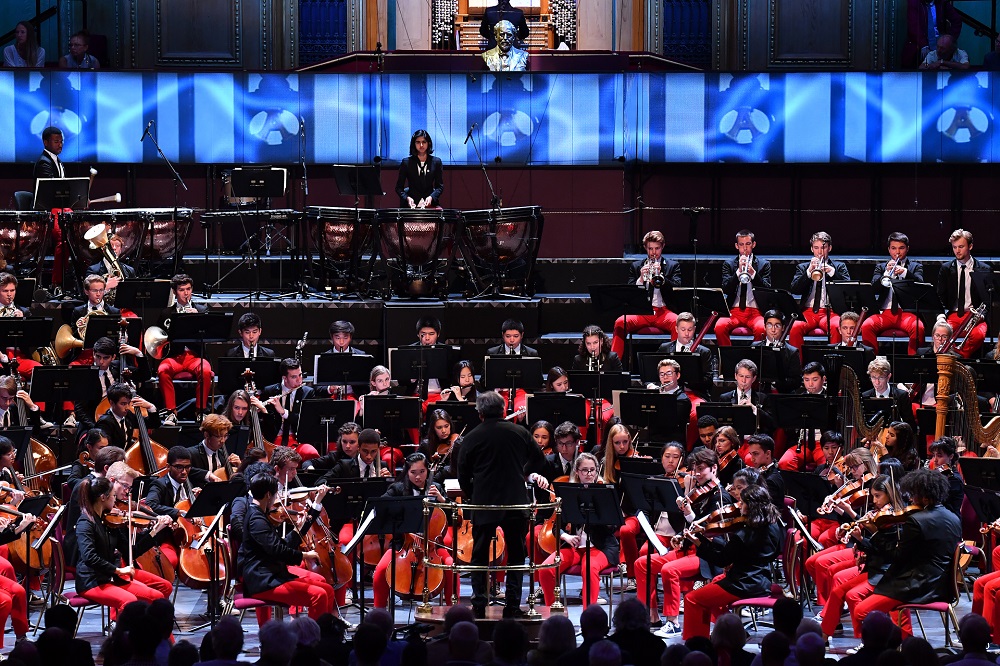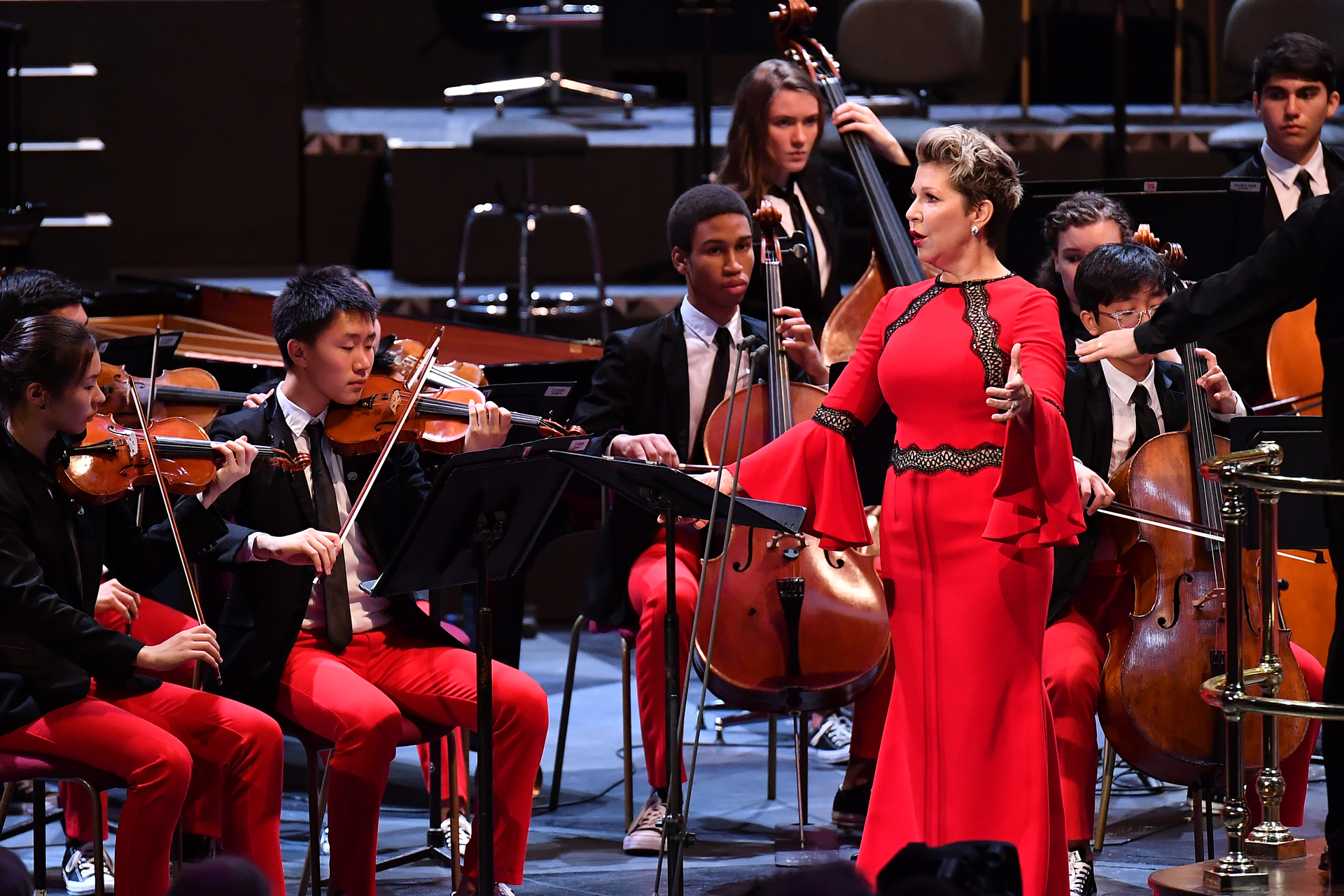Edinburgh International Festival 2019: Colin Currie Group, BBCSSO, Dausgaard/DiDonato, NYO-USA, Pappano | reviews, news & interviews
Edinburgh International Festival 2019: Colin Currie Group, BBCSSO, Dausgaard/DiDonato, NYO-USA, Pappano
Edinburgh International Festival 2019: Colin Currie Group, BBCSSO, Dausgaard/DiDonato, NYO-USA, Pappano
Experienced Scots tackle percussive Gubaidulina, young Americans in Prokofiev
With Peter Gynt, the National Theatre’s “reboot” of Ibsen’s Peer Gynt, topping the drama bill at the Edinburgh Festival hotfoot from London, it was almost obligatory to find a space somewhere in the music programme for Grieg’s famous incidental music from 1876. But what would you put in the rest of the programme?
This was a 40 minute musical and theatrical spectacle. There were more things on stage you can hit, rattle, or shake than I have ever seen before, even in the early percussion-heavy scores by James MacMillan. Two complete sets of tuned gongs, bongos, every possible incarnation of the glockenspiel-marimba family, bodhrans, woodblocks, and in front of it all five huge bass drums. Not content with that, Gubaidulina’s score demands a large orchestra with its own comprehensive percussion section, with two harps and a celeste thrown in for good measure.  This is theatrical music-making. Conductor Thomas Dausgaard seemed almost irrelevant as the Colin Currie Group (pictured above) stole the show, darting from instrument to instrument, weaving under gongs, slipping silently into each new position, exchanging mischievous glances, responding to each other’s cues with practised synergy. Large amounts of the piece are improvisatory. In these sections, led by Currie, you could see motifs evolve and blossom. In one striking passage Currie has a tuned bongo that seems to challenge a double bass to maintain a musical conversation.
This is theatrical music-making. Conductor Thomas Dausgaard seemed almost irrelevant as the Colin Currie Group (pictured above) stole the show, darting from instrument to instrument, weaving under gongs, slipping silently into each new position, exchanging mischievous glances, responding to each other’s cues with practised synergy. Large amounts of the piece are improvisatory. In these sections, led by Currie, you could see motifs evolve and blossom. In one striking passage Currie has a tuned bongo that seems to challenge a double bass to maintain a musical conversation.
It is equally a cornucopia of exotic sound such as you might hear in a film soundtrack as our hero delves deep into a hostile jungle: primaeval footsteps, unearthly rattles and eerie glissandi. Something I have never seen (or heard) before is the strangely pitchless but penetrating reverberation produced by dragging what looked like a pink lollipop across the skin of a drum.
It’s all very well creating a sonic and choreographic spectacle, but Gubaidulina’s achievement is to weave this cabinet of curiosities into an orchestral tapestry with a sense of both meaning and progression. Her gestures are spare – a rich and luscious intervention from the strings is barely two notes but hints at more, the great climax with the five bass drums filling the hall rests on a simple ascending motif. The effect is an extraordinary but satisfying experience that is a great deal more than the sum of its parts.  If you turn the question around, what would have been the best piece to partner Glorious Percussion? Some crazy Schnittke perhaps, or a late Shostakovich symphony, so the reversion after the interval to the mellifluous world of Grieg’s Peer Gynt was bound to be something of an anti-climax, for all its popularity. That said, it was exquisitely played. In its own way it is also a bit of an orchestral showcase, with glittering percussion and gorgeous woodwind solos. The BBC Scottish Symphony strings have never sounded better in the Death of Ase. In Solveig’s Song the soprano Malin Christensson (pictured above) was radiantly clear but just a little too penetrating – her demeanour not unlike an over eager hostess pressing her guest to another canapé.
If you turn the question around, what would have been the best piece to partner Glorious Percussion? Some crazy Schnittke perhaps, or a late Shostakovich symphony, so the reversion after the interval to the mellifluous world of Grieg’s Peer Gynt was bound to be something of an anti-climax, for all its popularity. That said, it was exquisitely played. In its own way it is also a bit of an orchestral showcase, with glittering percussion and gorgeous woodwind solos. The BBC Scottish Symphony strings have never sounded better in the Death of Ase. In Solveig’s Song the soprano Malin Christensson (pictured above) was radiantly clear but just a little too penetrating – her demeanour not unlike an over eager hostess pressing her guest to another canapé.
The following evening found the Usher Hall in a very different mood. Where Grieg and Gubaidulina drew, by festival standards, a thin audience, the lure of Joyce DiDonato singing Berlioz with the National Youth Orchestra of the USA was enough to fill the hall to near capacity. Like other youth orchestras, NYO-USA re-invents itself annually, with a surprisingly young age range (16-19). Dressed in vibrant red pants (as they say over the pond) and identical trainers, it looks and feels young, dynamic, and very large (pictured below with Antonio Pappano at the BBC Prom two days later). 
The orchestra halved in size for Berlioz's ultra-romantic song cycle Les nuits d’été. Joyce DiDonato (pictured below) belongs to the pantheon of superstars that even in the festival is something of a rarity in Edinburgh, and she did not for a moment disappoint. We were spellbound from the first note to the last, each song exquisitely framed both psychologically and emotionally, her gestures, facial expression, and tone perfectly matched to Berlioz’s sumptuous settings. She has a trick of throwing her head to the side, casting the voice into the wings, so that it seems to fill the hall several times over – masterful and extremely effective. Don’t miss her at the Proms on Sunday. 
rating
Explore topics
Share this article
The future of Arts Journalism
You can stop theartsdesk.com closing!
We urgently need financing to survive. Our fundraising drive has thus far raised £49,000 but we need to reach £100,000 or we will be forced to close. Please contribute here: https://gofund.me/c3f6033d
And if you can forward this information to anyone who might assist, we’d be grateful.

Subscribe to theartsdesk.com
Thank you for continuing to read our work on theartsdesk.com. For unlimited access to every article in its entirety, including our archive of more than 15,000 pieces, we're asking for £5 per month or £40 per year. We feel it's a very good deal, and hope you do too.
To take a subscription now simply click here.
And if you're looking for that extra gift for a friend or family member, why not treat them to a theartsdesk.com gift subscription?
more Classical music
 Hallé John Adams festival, Bridgewater Hall / RNCM, Manchester review - standing ovations for today's music
From 1980 to 2025 with the West Coast’s pied piper and his eager following
Hallé John Adams festival, Bridgewater Hall / RNCM, Manchester review - standing ovations for today's music
From 1980 to 2025 with the West Coast’s pied piper and his eager following
 Kaploukhii, Greenwich Chamber Orchestra, Cutts, St James's Piccadilly review - promising young pianist
A robust and assertive Beethoven concerto suggests a player to follow
Kaploukhii, Greenwich Chamber Orchestra, Cutts, St James's Piccadilly review - promising young pianist
A robust and assertive Beethoven concerto suggests a player to follow
 Robin Holloway: Music's Odyssey review - lessons in composition
Broad and idiosyncratic survey of classical music is insightful but slightly indigestible
Robin Holloway: Music's Odyssey review - lessons in composition
Broad and idiosyncratic survey of classical music is insightful but slightly indigestible
 Classical CDs: Wolf-pelts, clowns and social realism
British ballet scores, 19th century cello works and contemporary piano etudes
Classical CDs: Wolf-pelts, clowns and social realism
British ballet scores, 19th century cello works and contemporary piano etudes
 Bizet in 150th anniversary year: rich and rare French offerings from Palazzetto Bru Zane
Specialists in French romantic music unveil a treasure trove both live and on disc
Bizet in 150th anniversary year: rich and rare French offerings from Palazzetto Bru Zane
Specialists in French romantic music unveil a treasure trove both live and on disc
 Scottish Chamber Orchestra, Ibragimova, Queen’s Hall, Edinburgh review - rarities, novelties and drumrolls
A pity the SCO didn't pick a better showcase for a shining guest artist
Scottish Chamber Orchestra, Ibragimova, Queen’s Hall, Edinburgh review - rarities, novelties and drumrolls
A pity the SCO didn't pick a better showcase for a shining guest artist
 Kilsby, Parkes, Sinfonia of London, Wilson, Barbican review - string things zing and sing in expert hands
British masterpieces for strings plus other-worldly tenor and horn - and a muscular rarity
Kilsby, Parkes, Sinfonia of London, Wilson, Barbican review - string things zing and sing in expert hands
British masterpieces for strings plus other-worldly tenor and horn - and a muscular rarity
 From Historical to Hip-Hop, Classically Black Music Festival, Kings Place review - a cluster of impressive stars for the future
From quasi-Mozartian elegance to the gritty humour of a kitchen inspection
From Historical to Hip-Hop, Classically Black Music Festival, Kings Place review - a cluster of impressive stars for the future
From quasi-Mozartian elegance to the gritty humour of a kitchen inspection
 Shibe, LSO, Adès, Barbican review - gaudy and glorious new music alongside serene Sibelius
Adès’s passion makes persuasive case for the music he loves, both new and old
Shibe, LSO, Adès, Barbican review - gaudy and glorious new music alongside serene Sibelius
Adès’s passion makes persuasive case for the music he loves, both new and old
 Anja Mittermüller, Richard Fu, Wigmore Hall review - a glorious hall debut
The Austrian mezzo shines - at the age of 22
Anja Mittermüller, Richard Fu, Wigmore Hall review - a glorious hall debut
The Austrian mezzo shines - at the age of 22
 First Person: clarinettist Oliver Pashley on the new horizons of The Hermes Experiment's latest album
Compositions by members of this unusual quartet feature for the first time
First Person: clarinettist Oliver Pashley on the new horizons of The Hermes Experiment's latest album
Compositions by members of this unusual quartet feature for the first time

Add comment